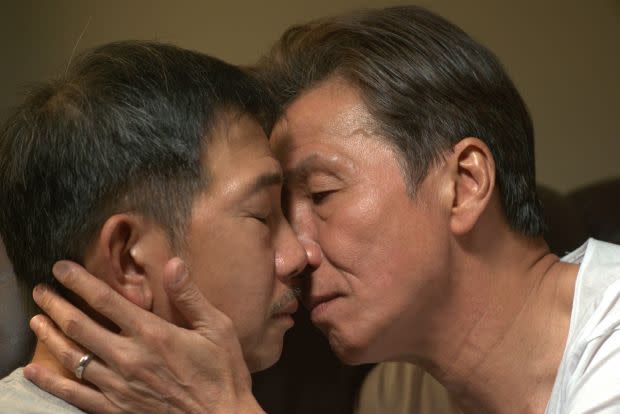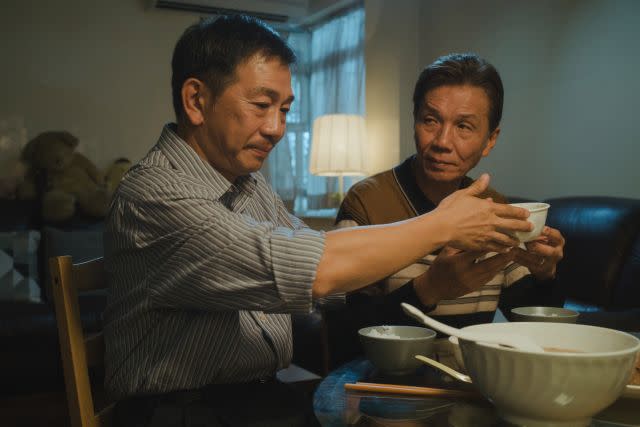Hong Kong’s best new romance is about the secret lives of the city’s closeted gay “uncles”

Pak is a 70-year-old taxi driver who has a wonderful family and refuses to retire. Hoi, a 65-year-old retired divorcee, lives with his son’s family. The two share a secret: a forbidden love affair that is doomed to fail from the beginning. But they seize their moments together so that they can be their true selves when they are in each other’s arms.
Suk Suk isn’t Hong Kong’s first gay romance but it is the first to portray the lives of the city’s oldest generation of of gay men, who struggled to maintain a family life indoctrinated by traditional Chinese values. Hong Kong filmmaker Ray Yeung’s latest work has only had limited screenings in the city, but has quickly become a critics’ darling since its premier at the Busan film festival in South Korea last year.
It was voted best film by the Hong Kong Film Critics Society and Tai Po, the actor who plays Pak, was voted best actor. It also garnered five nominations, including best film, at the Golden Horse Film Awards in Taiwan last November. The film will be screened at the Berlin International Film Festival, which opens on Friday (Feb. 21), before having a general release in Hong Kong in April. The film recently earned nine nominations for this year’s Hong Kong Film Awards including best film, best director and best screenplay for Yeung and best actor for Tai Po.
Yeung, a board member and curator of the Hong Kong Lesbian and Gay Film Festival, said the film was inspired by University of Hong Kong professor Travis Kong’s book Oral History of Older Gay Men in Hong Kong, which was first published in Chinese in 2014 (a paperback version in English was released in 2019). The book documents the life stories of 12 elderly gay men, some of whom Yeung met, inspiring him to make the movie.
There is no lack of gay films in Chinese-language cinema or in Asia. Some of the most notable ones include Stanley Kwan’s Lan Yu (2001), Farewell My Concubine (1993) by Chen Kaige and Wong Kar-wai’s Happy Together (1997).
But unlike these past titles, Suk Suk is not driven by highly dramatized plot twists, heart-wrenching romance or extravagant sets and locations. Rather, the director, who is also the film’s writer, tells the emotionally-charged story through seemingly ordinary scenes, such as dinners. “Dinners are the best way to illustrate family dynamics,” said Yeung.
Indeed, whether it is taxi driver Pak who shares a hairy crab with his wife who suspects he’s having affair with a man, or retiree Hoi, who dines with his religious son who strives to maintain the stability of the household, these family dinners are never about the food but about the danger that the love affair between the two men could’ve broken these families.
Dinner also has a role to play in the affair between Pak and Hoi: They shop for ingredients at a wet market and cook a meal together at Hoi’s place, pictured below, when his family is away for the weekend. What would be an uneventful routine for many other couples is a major highlight for them.

Pak, right, and Hoi share a dinner together in ‘Suk Suk.’
Saunas, where Pak and Hoi also have their romantic rendezvous, are another key setting for the story. One of the scenes sees Pak and Hoi sharing a cheerful meal with other older gay men at the sauna’s dining room.
“The interviewees told me a lot about these saunas. They are usually very busy around 2-3pm and people leave after 6pm to go home to be with their families. Most of them are married men who go there secretly,” said Yeung, speaking to the audience after one of the movie’s previews. “But rather than going there for sex, they are more or less like a friendship club. They just sit there and talk. One of the saunas has a karaoke room where people sing Cantonese opera. They just want a few hours to be themselves.”
Added Yuen, “This also gets me to think about the definition of family today—does it have to be blood-related? Or does family mean a safe place where you can be who you really are?”
The film also touches on the need for retirement homes where people of different sexual orientations can feel welcome, a reference to an actual topic of discussion in Hong Kong. At a home where Hoi volunteers, a group of elderly gay men discuss a campaign for the establishment of a retirement home tailor-made for older people with different sexual orientations. Gay rights activist Shimily, who spoke at the Legislative Council on the issue in real life, has a cameo in these scenes.
By entering a home one has to give up his or her privacy, said Yeung. But even then, in many cases, he added, people die in Hong Kong without ever coming out.
Correction, Feb. 20: This article incorrectly earlier described Suk Suk as Ray Yeung’s directorial debut. It’s his third feature-length movie.
Sign up for the Quartz Daily Brief, our free daily newsletter with the world’s most important and interesting news.
More stories from Quartz:

